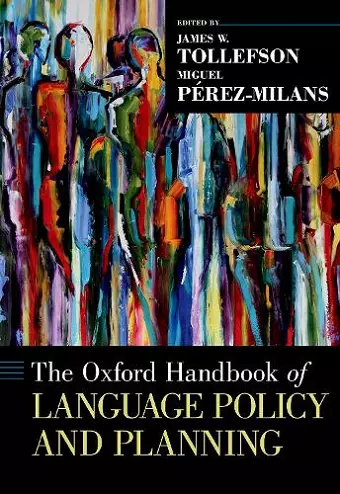The Oxford Handbook of Language Policy and Planning
James W Tollefson editor Miguel Perez-Milans editor
Format:Hardback
Publisher:Oxford University Press Inc
Published:28th Jun '18
Currently unavailable, currently targeted to be due back around 20th December 2025, but could change

Winner of the BAAL Book Prize for 2019
In 35 chapters by leading scholars in language policy and planning (LPP), this Handbook critically examines current theoretical and methodological transformations taking place in LPP. Sections on LPP theory, nation-states and communities, and late modernity, plus an integrative summary, offer a state-of-the-art profile of LPP and directions for future research.This Handbook provides a state-of-the-art account of research in language policy and planning (LPP). Through a critical examination of LPP, the Handbook offers new direction for a field in theoretical and methodological turmoil as a result of the socio-economic, institutional, and discursive processes of change taking place under the conditions of Late Modernity. Late Modernity refers to the widespread processes of late capitalism leading to the selective privatization of services (including education), the information revolution associated with rapidly changing statuses and functions of languages, the weakening of the institutions of nation-states (along with the strengthening of non-state actors), and the fragmentation of overlapping and competing identities associated with new complexities of language-identity relations and new forms of multilingual language use. As an academic discipline in the social sciences, LPP is fraught with tensions between these processes of change and the still-powerful ideological framework of modern nationalism. It is an exciting and energizing time for LPP research. This Handbook propels the field forward, offering a dialogue between the two major historical trends in LPP associated with the processes of Modernity and Late Modernity: the focus on continuity behind the institutional policies of the modern nation-state, and the attention to local processes of uncertainty and instability across different settings resulting from processes of change. The Handbook takes great strides toward overcoming the long-standing division between "top-down" and "bottom-up" analysis in LPP research, setting the stage for theoretical and methodological innovation. Part I defines alternative theoretical and conceptual frameworks in LPP, emphasizing developments since the ethnographic turn, including: ethnography in LPP; historical-discursive approaches; ethics, normative theorizing, and transdisciplinary methods; and the renewed focus on socio-economic class. Part II examines LPP against the background of influential ideas about language shaped by the institutions of the nation-state, with close attention to the social position of minority languages and specific communities facing profound language policy challenges. Part III investigates the turmoil and tensions that currently characterize LPP research under conditions of Late Modernity. Finally, Part IV presents an integrative summary and directions for future LPP research.
The Oxford Handbook of Language Policy and Planning... is one of few handbooks that go beyond the mere collection of existing knowledge...this Handbook offers a very good foundation for future research and for negotiating the aims, possibilities, and limitations of the field in years to come * Iair G. Or, Tel Aviv University, Journal of Language and Politics *
While space limitations meant that it was impossible to touch upon all of the handbook's chapters here, I would say that, without a doubt, this volume is a 'must-have' for LPP scholars, practitioners and students. The accumulated knowledge, experience and dedication demonstrated by all of the contributors and the editors are evidence of exciting new stages in LPP research. * Kayoko Hashimoto, University of Queensland, Journal of Multilingual and Multicultural Development *
- Winner of Winner of the BAAL Book Prize for 2019.
ISBN: 9780190458898
Dimensions: 249mm x 178mm x 48mm
Weight: 1438g
780 pages